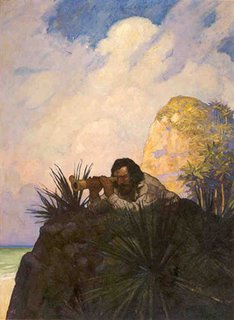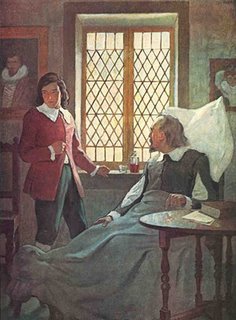Robinson Crusoe by Daniel Defoe - Part 11
 Download Robinson Crusoe - Part 11
Download Robinson Crusoe - Part 11Crusoe makes another shocking discovery and sets himself on a course of action that leads him to one of the book's most interesting passages. It is here, in Crusoe's struggle with his own outrage and his ideas about what makes for civilized behavior, that Defoe begins to turn the novel in a new direction. He is examining the underpinnings of Western civilization. What makes a person civilized? What does the right of self defense really mean? This kind of thinking and questioning is perhaps somewhat lacking in certain countries today. Notice also how religion, for Crusoe, seems to have a moderating, calming influence. He resists using it to justify himself or his actions.









